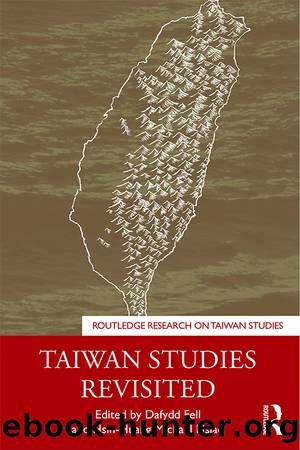Taiwan Studies Revisited by Dafydd Fell Hsin-Huang Michael Hsiao

Author:Dafydd Fell, Hsin-Huang Michael Hsiao [Dafydd Fell, Hsin-Huang Michael Hsiao]
Language: eng
Format: epub
ISBN: 9780367201715
Goodreads: 45552459
Publisher: Routledge
Published: 2019-09-10T00:00:00+00:00
The politics of writing, reception and extension
Politics swirl around Is Taiwan Chinese? â international politics about Taiwanâs future and Chinaâs rise, PRC politics about studying politically sensitive topics, and US academic politics about contested approaches (the so-called culture wars, lingering Cold War sentiment against Taiwan, and gender politics). So it is worth understanding how these politics have influenced the construction of the book itself as well as its reception and subsequent research.18 I began writing the book in 1997 during a second postdoctoral fellowship at the University of California at Berkeley, wrote much of it while juggling my first tenure-line faculty job (as an assistant professor of anthropology at the University of Cincinnati) with family responsibility (my daughter was born in 1998), and finalised the manuscript in 2001 as an assistant professor at Stanford in the anthropological sciences department â one of two anthropology departments at Stanford, the fallout of particularly vicious culture-wars infighting during the 1990s (Gibbs 1998). My postdoctoral fellowship at Berkeley gave the University of California Press the right of first refusal on the book manuscript, but â as then Asian-studies acquisitions editor Sheila Levine informed me in 1996 â Cal Press had never yet published a book about Taiwan and it was one of the few academic presses at the time that was turning a profit.19 That context influenced my writing.
At Berkeley, as I was framing the book, I had advice to write a book that would sell (Sheila Levine), to put China in the title (Arthur Wolf), leave out anthropological theory entirely (Fred Wakeman) and not worry that statements the PRC might view as critical would prevent future research there as long as the comments are published only in English (Steve Harrell, Fred Wakeman). Since US anthropology largely ignores Taiwan and even China and moreover the manuscript was going to Cal Pressâs Asian studies editor for review, I knew that I couldnât use the standard anthropological structure of beginning with a theory chapter (but because I was on the job market in anthropology, I could not entirely omit theory, so I put it at the end of the book). I worried a lot about Levineâs explicit comment to me (and Philip Kafalas, another postdoc at Berkeley that year) that excellent scholarship was not sufficient for acceptance at Cal Press; the proposed book had to be expected to bring in revenue too. Arthur Wolf told me that Levineâs statement meant I had to put China in the title; he said Stanford University Press always insisted he use âChinaâ in his titles for marketing reasons. I had originally planned to title the book âAt the Border to Hanâ, as I was already using âHanâ for ethnic identity and âChineseâ for national identity, but Levine said something with China or Chinese in the title would be more marketable. I had used the title âOn Becoming Chineseâ for a 1994 paper presented at a panel I organised for UC Berkeleyâs annual China symposium that later became the basis of my 1996 edited volume.
Download
This site does not store any files on its server. We only index and link to content provided by other sites. Please contact the content providers to delete copyright contents if any and email us, we'll remove relevant links or contents immediately.
| Central Asia | Southeast Asia |
| China | Hong Kong |
| India | Japan |
| Korea | Pakistan |
| Philippines | Russia |
The Sympathizer by Viet Thanh Nguyen(4384)
The Rape of Nanking by Iris Chang(4202)
World without end by Ken Follett(3474)
Ants Among Elephants by Sujatha Gidla(3460)
Blood and Sand by Alex Von Tunzelmann(3194)
Japanese Design by Patricia J. Graham(3163)
The Queen of Nothing by Holly Black(2586)
City of Djinns: a year in Delhi by William Dalrymple(2547)
Foreign Devils on the Silk Road: The Search for the Lost Treasures of Central Asia by Peter Hopkirk(2454)
India's Ancient Past by R.S. Sharma(2450)
Inglorious Empire by Shashi Tharoor(2436)
Tokyo by Rob Goss(2427)
In Order to Live: A North Korean Girl's Journey to Freedom by Yeonmi Park(2377)
Tokyo Geek's Guide: Manga, Anime, Gaming, Cosplay, Toys, Idols & More - The Ultimate Guide to Japan's Otaku Culture by Simone Gianni(2360)
India's biggest cover-up by Dhar Anuj(2349)
The Great Game: On Secret Service in High Asia by Peter Hopkirk(2329)
Goodbye Madame Butterfly(2249)
Batik by Rudolf Smend(2179)
Living Silence in Burma by Christina Fink(2060)
